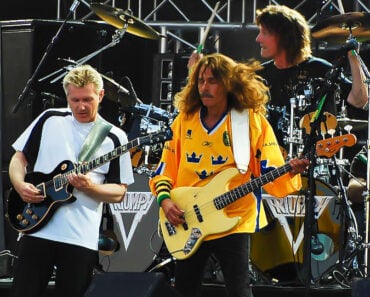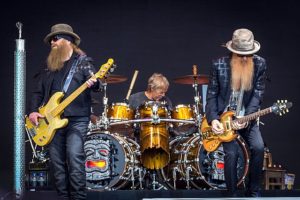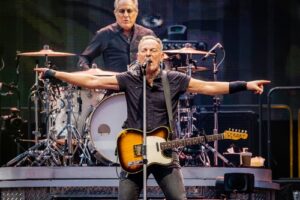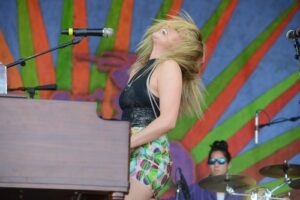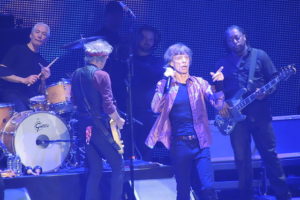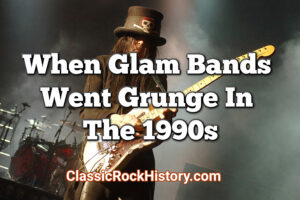
Feature Photo: Zal Cleminson of the Sensational Alex Harvey Band – image courtesy of Zal Cleminson
As a self-taught six-stringer, Zal Cleminson’s road to stardom amongst a hectic ’70s glam rock scene looked a bit different than some of his peers.
A turbulent childhood gave way to an intense passion for music, specifically early rock ‘n’ roll, leading to the aspiring axe-slinger picking up the electric guitar. From there, Cleminson’s rise was meteoric, settling in with cult act, Tear Gas before trials and tribulations led to a meeting of the minds, culminating in the formation of the glam rock super act, The Sensational Alex Harvey Band.
For several years, Cleminson played sideman to Harvey, creating inspiring and influential music that would aid in defining the decade. But the typical troubles with plague many bands led to a falling out, and soon Cleminson was on the road again, taking shelter with fellow scene mates, Nazareth.
While Cleminson’s time with Nazareth was short, his legacy looms large nonetheless. In the modern age, Cleminson continues to make music on his own terms, fostering a scene of self through his music and other artistic endeavors. To be sure, Zal Cleminson’s legacy as an unheralded glam rock forefather is set in stone, but his musical future remains uncertain. But none of that seems to bother the veteran guitarist, and he remains dutifully focused on what he’s yet to do, leaving his past firmly in the rearview mirror.
Gearing up to create new music once again, Zal Cleminson logged on with ClassicRockHistory.com to take readers on a tour through his long and varied career while giving gentle insight into what’s next as he forges ahead.
What did your upbringing look like prior to you becoming involved in music?
I was born in Penilee, Glasgow, in May 1949. I was born into a working-class family, living with my grandparents in a house specially built during the war for workers in the Roll Royce factory nearby. It was a damp house with metal frame windows. I shared a bedroom with my sister. Aged seven, together with our parents, we emigrated to Australia. The boat trip took us around the Cape of Good Hope, across the Indian Ocean to Australia. I had my eighth birthday crossing the Equator.
For three and a half years, we lived in an immigration camp in Adelaide, awaiting citizenship. The heat, however, proved to be too much for my mother, and we sailed back to Britain via the Suez Canal. I went back to the same school with an Australian accent. My classmates thought I was an Aboriginal.
What inspired you to pick up the guitar?
In Australia, I heard Elvis Presley, Bill Haley, Buddy Holly, etc. My parents listened to Doris Day and Bing Crosby. Back in Glasgow, in my early teens, I started to listen to Chuck Berry, Wes Montgomery, and Kenny Burrell, guitarists who have influenced me to this day. I decided to try and play the guitar. My first electric guitar, which my parents paid for, was a Hofner Verythin. From there on, I never wanted to play any other instruments.
Can you recount your early gigs as an up-and-coming musician?
While still at school in Penilee, I formed a band called the Bo-Weevils with Dave Batchelor and three other schoolmates. Our first gig was playing at the school dance – you call it Prom Night. We joined the Scottish music circuit, playing everywhere and anywhere until we had attracted a loyal fan base. Stax mostly influenced our music, Tamla, Soul, and Blues, and the occasional West Coast sounds of The Association and The Byrds. Glasgow at this time had many clubs and dance halls, upon which the city’s various gangs would converge and attempt to kill one another. Fortunately, no one died, so in the late ’60s, the band morphed into Tear Gas.
What more can you tell me about the early years of Tear Gas?
Tear Gas took a much more progressive route, and subsequently, it was necessary to find the right musicians. Chris Glen and Ted McKenna provided a perfect rhythm section. Our first gig was at the Electric Gardens in the center of Glasgow. Most of the crowd wandered away because they couldn’t dance to the music. Ironic. Soon enough, we had attracted an even bigger following who preferred to smoke dope and sit cross-legged on the floor—further irony. Tear Gas allowed me to express myself more fully on the guitar, trying to emulate my heroes like Jeff Beck and Ritchie Blackmore. Then I heard Frank Zappa and decided to stick to my own playing style.
Can you recount the recording of Tear Gas’s self-titled debut, which remains a cult classic?
The Tear Gas album came about because of our manager, Eddie Tobin. He helped build the band’s reputation further afield, even into Europe. We were offered the chance to record. I can’t recall where the first album was recorded; the second album was at a Wembley studio in London. I have little recollection of writing either album; Dave [Batchelor] and I wrote all the songs. No further details come to mind.
How did Tear Gas come to an end leading up to teaming up with Alex Harvey?
Two guys, both called Tony, helped to produce and distribute the Tear Gas albums. The band toured all over the U.K. and occasionally into Germany, Netherlands, and France. I don’t recall any stand-out gigs; they were all equally inspired. The second album is much heavier and more guitar driven. We used a session keyboard player named Ronnie Leahy when required. We were still pretty raw and a little naïve but full of ideas and energy, which the two Tony’s admired.
I think Tony Chapman ran off with a bunch of royalties/money – but don’t quote me on that! Dave and I wrote the songs. My favorite tracks are: “Witches Come Today,” “Where Is My Answer,” “Woman for Sale,” and “St. Anthony” with Alex Harvey on vocals. The band was struggling to pay the bills. Most of us were on state benefits. We were on the point of winding it up when Alex came along.
You were a member of The Sensational Alex Harvey Band from 1972 through 1978. How did you become a member of the band?
Our respective managers suggested merging the two entities. We got together with Alex for a brief rehearsal and heard something everyone liked, plus it meant keeping the band together. Ted’s cousin Hugh [McKenna] had recently joined Tear Gas on keyboards and vocals. Alex was cool. Very professional and obviously an experienced frontman. The Sensational Alex Harvey Band was unique. Often a little indulgent. But essentially, it worked because of the chemistry between the band members, on and off stage. Musically we never quite reached a peak – Rock Drill was hindered by ill health, a touch of ill-discipline, and a sense of lethargy at this stage.
What are your fondest memories from that period?
The highlight for many people, including fans, was our headline show at the Reading Festival and the infamous Xmas Special shows in Glasgow and London. Touring the states was always a gas. I’m not in contact with the members who have died; I try to avoid that kind of stuff. I don’t see Chris; we live in different parts of the country and, to some extent, in a different universe.
What led you to join Nazareth in 1979?
I joined Nazareth to pay off my debt to their management company – that’s how it felt. The two projects were thrust at me, hoping I could provide some creativity, which I did. I enjoyed the recording and touring.
Moving forward into the 90s, you were a member of the Party Boys. Take me through the formation and progression of that band, which eventually became a reformed SAHB.
Party Boys was an ill-conceived idea that Ted had. It never really worked. Max Maxwell auditioned as a vocalist for The Sensational Alex Harvey Band. He impressed me so much that I decided to give it one more go. I got dressed up and stuck on the makeup, which worked reasonably well. The resulting album is yet another version of all things Sensational Alex Harvey Band. It’s ok, but I got bored repeating myself – in more ways than one – so I decided to call it a day.
What led to your temporary retirement, and what drew you out of it?
I took part in a film called A Shot in The West, for which I wrote some of the music. It was a favor to a young Glasgow film director, Bob Kelly. I took a long sabbatical starting in 2008. My marriage had ended, and I moved to Cyprus with my new partner. During this time, I had a complete mental breakdown. That’s when I decided to pick up the guitar again.
Now that you’re active again, what’s next as you move forward?
I wrote a whole bunch of new songs and made some demos with a Glasgow keyboard player, David Cowan. I eventually formed the band Sin Dogs. We recorded an album and toured here and there. It fell apart for no good reason – a difference in musical direction is the usual mantra. Now I’m working with Billy McGonagle on creating new music for a project called Orphans of the Ash (downloads available soon). I’m also completing the final draft of a novel, which I hope to publish soon.
An Interview with Zal Cleminson of The Sensational Alex Harvey Band & Nazareth
Zal Cleminson: The ClassicRockHistory.com Interview article published on Classic RockHistory.com© 2022
Classicrockhistory.com claims ownership of all its original content and Intellectual property under United States Copyright laws and those of all other foreign countries. No one person, business, or organization is allowed to re-publish any of our original content anywhere on the web or in print without our permission. All photos used are either public domain creative commons photos or licensed officially from Shutterstock under license with ClassicRockHistory.com. All photo credits have been placed at the end of the article. Album Cover Photos are affiliate links and the property of Amazon and are stored on the Amazon server. Any theft of our content will be met with swift legal action against the infringing websites.






